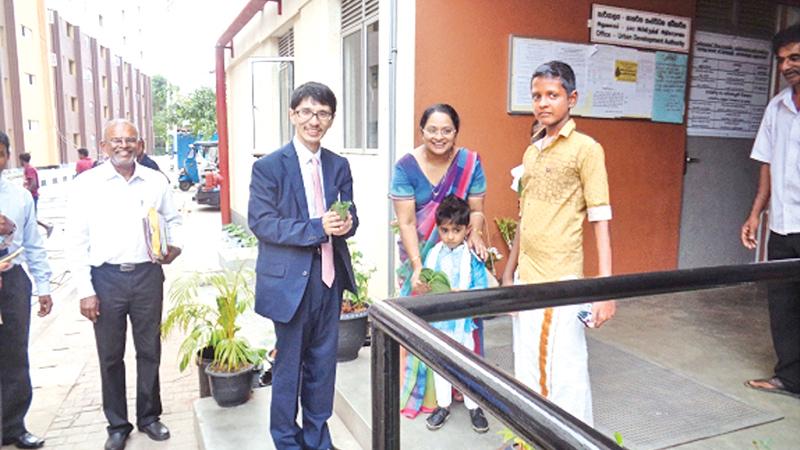
Sedawatta and Wadullawatta communities live at the edge of the Kelani river virtually under the bridge at Peliyagoda. For many these communities may be merely an eyesore. And many forget that those living under the bridge are also residents of Colombo, with rights, hopes, dreams and aspirations as those going on the bridge.
But, the new bridge construction project over the Kelani river financed by JICA (Japan International Cooperation Agency) gave an opportunity for them to build their lives. The new bridge runs parallel to the existing bridge, and bridge piers will be located at Sedawatta and Wadullawatta. The communities have to relocate if the bridge is to be constructed. The relocation is carried out in accordance with the National Involuntary Resettlement Policy and JICA’s guidelines for social and environmental considerations. Accordingly, project affected communities are compensated based on the principles of replacement cost to enable them to have an equivalent or better living standards.
The Road Development Authority (RDA) which is the implementing agency for the bridge construction project, with close cooperation from the Urban Development Authority (UDA) secured apartments for the over 400 households in UDA’s “Laksanda Sevana” housing complex in Salamulla. The 2nd apartment block in the complex was ceremonially opened by President Maithripala Sirisena on March 2.
The complex is located just a few kilometres away from the bridge, so the changes to their travelling times and surroundings are minimized. Almost the entire community opted to live in the complex, so the community ties can continue in the new site.
The project affected families receive ownership of their individual apartments on vacation of their existing premises. The apartments are larger than the houses they currently occupy and equipped with amenities including electricity and water connections. The Project Management Unit (PMU) provided them with guidance and assistance on furnishing and maintaining their apartments, operating equipment and mobilized community leaders to assist and sustain the process.
In order to ensure their living standards improve, an income restoration program is currently in progress. Through this, the householders received training, equipment and micro-finance facilities to start or expand home based industries such as shoe-making, incense sticks, dress-making, etc. The PMU continues the support them to expand sales, diversify and improve quality of products and be self-sustainable.
A Montessori and day-care center is being set up and selected residents are being trained to operate both. The PMU assisted the families to move their children to the closest school to the housing complex, so that children could now walk to school instead of the longer commute they had earlier.
Floods
During the floods in 2016 when this community was inundated, the PMU staff provided food for them, by contributing portion of their salary. At Laksanda Sevana, the PMU staff set up a library for the children, again using their own personal resources. The community members feel they have gained not only new homes, but also a new family in the PMU staff.
Thirty families have already moved and settled in the first building of Laksanda Sevana. They have used the training they received to furnish and equip the apartments in creative and innovative ways. Their ownership and pride are evident from the efforts they have put in to convert the houses into homes. The other families are in the process of moving to the second building after the ceremonial opening on March 2.
“The new bridge over the Kelani river will bring substantial economic benefits to Sri Lanka. But the direct benefits to the project affected communities through conducting the resettlement according to the National Involuntary Resettlement Policy and JICA’s Guidelines are of equal or higher value. Through this the lives of over 2,000 residents of Colombo have been uplifted, and definitely their contribution to the economy will rise. For the Project, there is the added benefit of their heartfelt support and contribution, because they feel the success of the Project is their own success. We hope this will be taken as an example and the same policies followed in all other public infrastructure projects” commented Mr. Kiyoshi Amada, the Chief Representative of JICA Sri Lanka Office.
Assistance
Japan International Cooperation Agency (JICA) is the executing agency of Japan’s Bilateral Official Development Assistance (ODA). JICA, the world’s biggest bilateral aid agency, works in over 150 countries and regions. In accordance with its vision of “Inclusive and Dynamic Development,” JICA supports the resolution of development issues in developing countries. In Sri Lanka, Japan has been providing financial and technical assistance since 1954 and is one of the largest donors to the country. On behalf of the people and the Government of Japan, JICA contributes to improve the lives of people in Sri Lanka.
